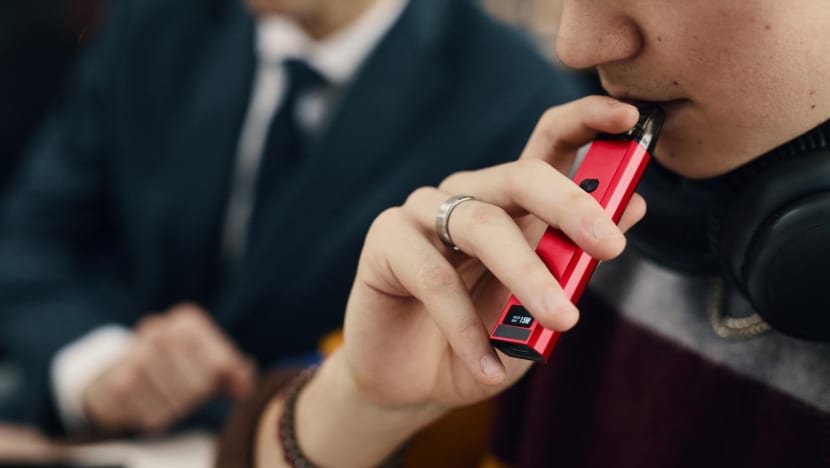Vaping in the workplace: Singapore employers urged to clarify rules, take action against offenders
The Ministry of Manpower says that companies should set their own HR policies, which could include disciplinary action, for employees who vape.

Vaping has become a workplace concern in Singapore, with both employers and employees having to navigate the issue. (Photo: iStock)

This audio is generated by an AI tool.
SINGAPORE: When Ms Su’s managers are not around, some of her colleagues take the opportunity to vape in the office.
In her team of about 20, five or six people vape, which can be uncomfortable in an enclosed space.
“I do feel like they tend to be conscious of doing it in front of other people who don’t vape, but then they still do it,” said the media professional, who did not want her full name published.
She added that the effects of secondhand vape exposure are "quite bad".
Vapour from e-cigarettes contains small particles of nicotine, metal and other harmful substances. Its impact is similar to that of second-hand cigarette smoke, according to an article by Mount Elizabeth Hospitals, and has also been linked to bronchitis and shortness of breath.
Ms Su is not aware of any policy against vaping at her workplace.
“It's hard for companies to enforce, because I think a lot of people use it as a coping mechanism to work,” she said.
Despite being illegal, vaping has grown in popularity in Singapore, raising public health concerns and sparking debate over workplace norms. The fruity flavours of vape products and the emergence of drug-laced Kpods have added to the alarm.
During his National Day Rally speech on Sunday (Aug 17), Prime Minister Lawrence Wong said Singapore will step up enforcement and treat vaping as a “drug issue”, with harsher penalties for sellers of harmful vape products.
The Ministry of Manpower (MOM) said vaping is an offence under the Tobacco Act because of the harm it causes.
“MOM encourages companies to set their own HR policies, which could include disciplinary action, to address situations where their employees contravene the law prohibiting vaping in Singapore,” a spokesperson said.
Some organisations already have rules in place. International education group EtonHouse has a zero-tolerance stance on drug abuse and smoking, outlined in its employee handbook.
“Vaping is illegal in Singapore, and EtonHouse takes compliance with local laws seriously,” a spokesperson said.
“Any violation of these policies may result in disciplinary action, including termination of employment.”
The firm also has a whistleblowing policy covering reportable breaches, though it has received no complaints about vaping so far.
CLEARER GUIDELINES NEEDED
The Association of Small and Medium Enterprises (ASME) said more companies are confronting new workplace challenges like vaping. It has received feedback from members seeking clearer guidelines on the issue.
“We encourage businesses to review and, where necessary, update their employee handbooks to clearly articulate company policy on such matters such that it is clear and unambiguous,” said ASME.
The Singapore National Employers Federation (SNEF) said it received a “small handful of queries” over the past year from companies dealing with staff who continued vaping after counselling.
The federation recommends that companies implement clear policies and tap on national initiatives to raise awareness about the health and legal risks of vaping.
“These measures help protect employees from exposure to harmful substances, safeguard employees’ health and align with ongoing national efforts against vaping.”
Disciplinary measures including termination may be taken where vaping persists despite education and counselling, it added.
The Singapore Human Resources Institute said some companies have extended no-smoking policies to cover vaping, which removes ambiguity.
It is important that companies make their stance against vaping clear to support fair and transparent enforcement, said CEO Alvin Aloysius Goh, adding that enforcement should not be overly punitive.
NO-VAPING POLICY
Assisted living firm Red Crowns Senior Living said it enforces a strict no-smoking and no-vaping rule across all its premises.
The policy has been in place since the company was formed in 2021, said CEO Joshua Goh. He added that whistleblowing channels are available to staff, though there have been no reports of vaping.
The possession and use of illegal drugs and vaping products is explicitly prohibited by preschool operator Busy Bees under its alcohol, drugs and smoking policy.
“This policy is reviewed regularly, with the most recent update completed this year,” the company said.
Star Bagawan bar owner Pravin Kumar said a part-time staff member was caught vaping at work earlier this year.
The second time it happened, the employee's vape device was confiscated by the manager and kept at the counter until his shift ended.
Mr Pravin said he told the employee to use the designated smoking area if he wished to smoke – but that vaping is not allowed in the bar.
“He was vaping indoors and outdoors as well, so I said, that one, we cannot accept.”
Other organisations told CNA that their staff are expected to obey Singapore’s laws.
The Public Service Division (PSD) said all public officers are expected to uphold the highest standards of personal conduct and to comply with Singapore's laws.
“Officers caught breaking the law on vaping will be subject to internal Public Service disciplinary action,” a spokesperson said, adding the disciplinary actions would be in addition to the penalties meted out by the Health Sciences Authority (HSA) or the courts.
PSD declined to provide further comment when CNA asked whether the disciplinary actions included warning letters, suspensions or terminations.
Mr Ernest Phang, managing director of group human resources at OCBC, also cited Singapore’s laws prohibiting the purchase, use and possession of vapes.
Whistleblowing channels are available for employees to raise concerns, including those related to vaping, and reports are treated with confidentiality, said Mr Phang.
“Staff will face disciplinary action and penalties, if caught vaping or in possession of vapes,” though he did not elaborate on what these penalties could be.
WHEN MANAGERS VAPE
A former employee of a logistics company said one of her bosses vaped when he was stressed, even during work calls while on camera.
While colleagues in her team did not vape in the office, she had heard that staff in other departments did, said the employee, who declined to be named.
In a screenshot seen by CNA, the company had sent out a message reminding staff that smoking and vaping were prohibited in the office, stairwells and cafeteria.
“If complaints still come flying in, please don’t blame us for looking into a fine system!” the message said.
Other employees have also encountered senior staff vaping. For Ms Lim, who works in communications, the “biggest boss” in her previous workplace vaped indoors. She did not feel there were proper channels to report her colleagues for vaping.
“If the top guy is already doing it, then everyone else who vapes would also just do it without any fear of consequence,” said Ms Lim, who did not want her full name published.
Singapore employment lawyer Jennifer Chih of PK Wong & Nair said employees can report such matters to the HSA, which will keep their identity confidential.
Last month, the HSA extended its hotline hours and launched a new platform for reporting vaping offences. People who witness a vaping offence and have evidence can report it at www.go.gov.sg/reportvape.
Still, workers may fear retaliation if they are found out.
Ms Lim said she had expressed her discomfort when colleagues vaped at their desks and during meetings. In response, they claimed second-hand vape smoke is not harmful – a common myth.
Despite the sweet smell of vape smoke, she said she was uneasy as she did not know what substances were in her colleagues’ e-cigarettes.
“It smells nicer than cigarette smoke, but I still don’t know what I’m inhaling and I don’t want to be forced to inhale it.”























